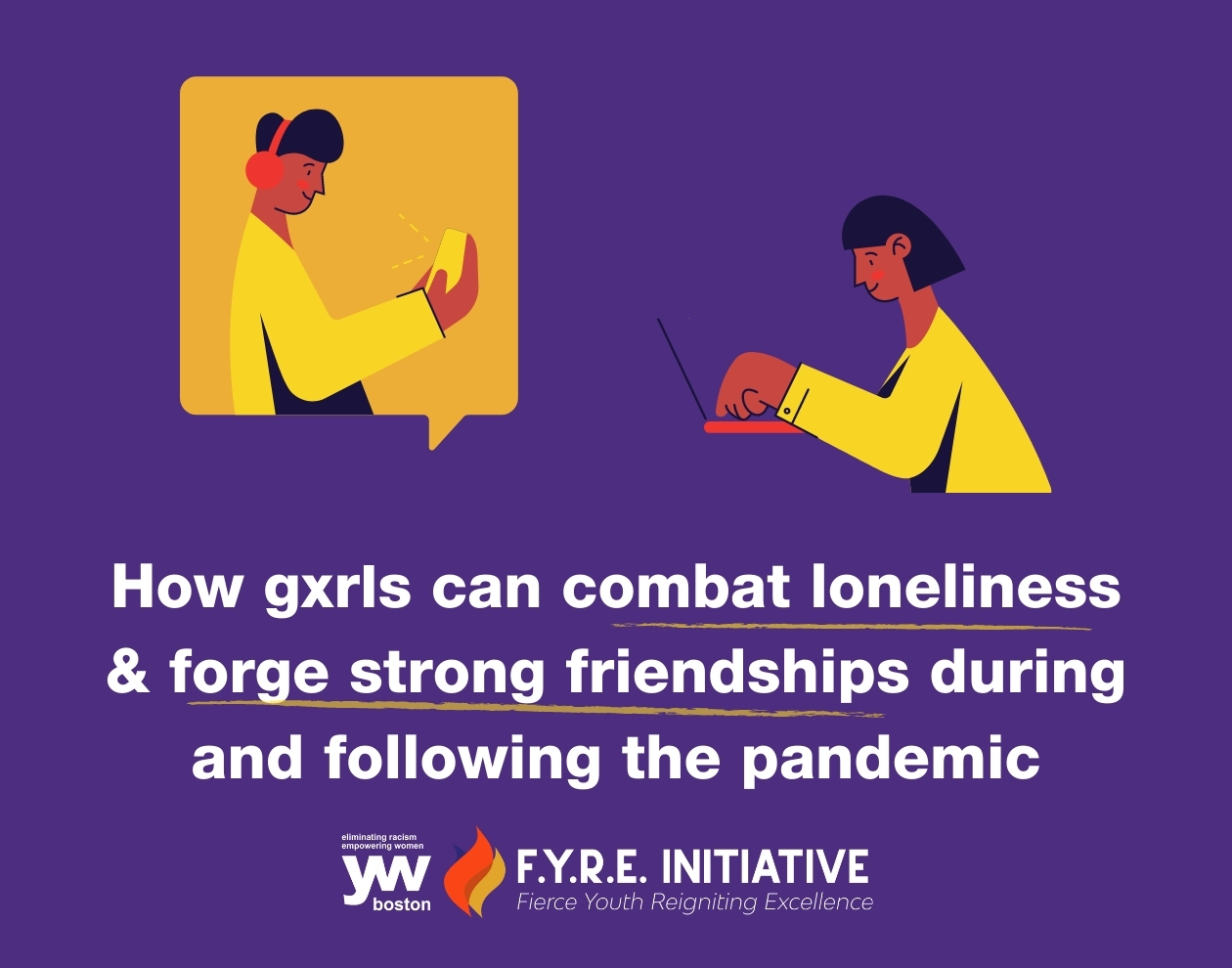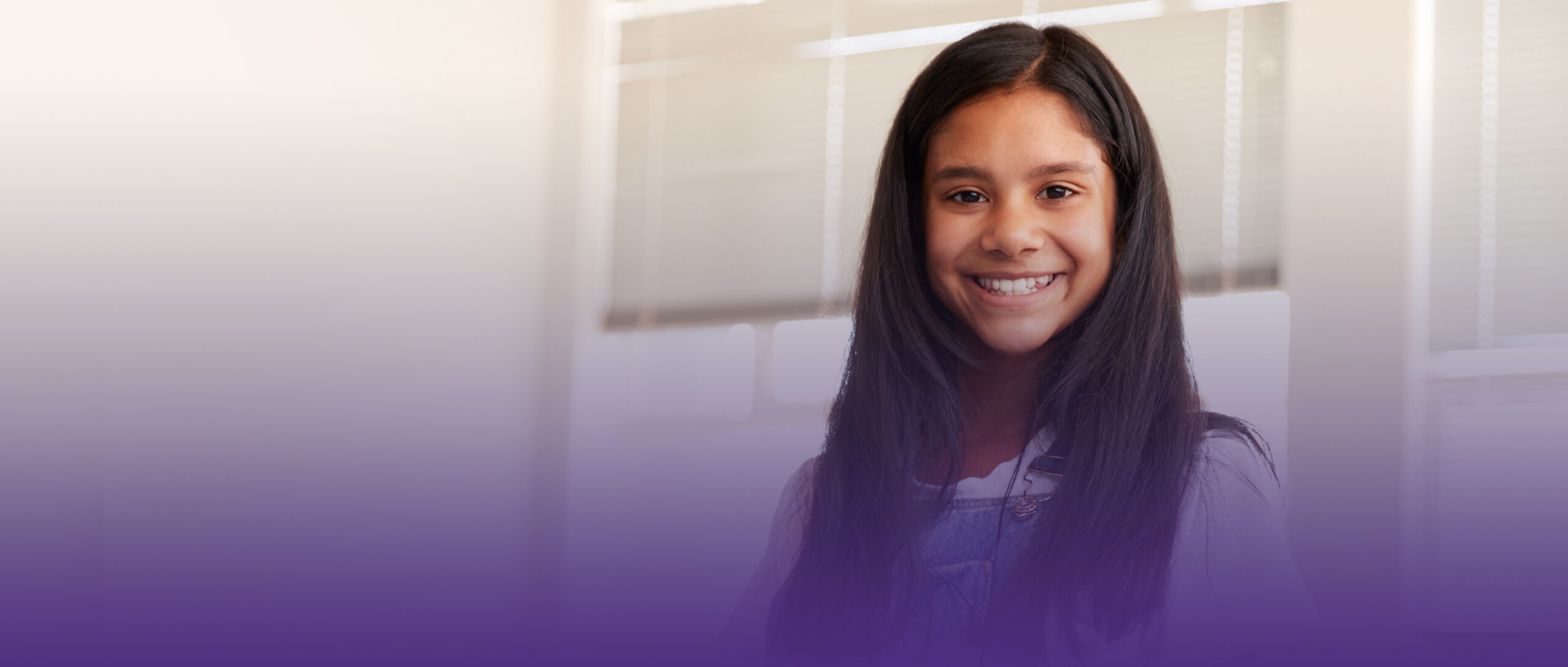
February 22, 2021
How gxrls can combat loneliness and forge strong friendships during and following the pandemic
Note: Throughout this article, we use the terms “womxn” and “gxrl” as terms to include anyone, including transgender, non-binary, genderfluid, polygender, and gender non-conforming people, whose key gender identity, experience, and internal perception on the spectrum of gender is woman or girl.
During the COVID-19 pandemic, it is crucial that we support one another, especially youth. It has been widely reported that teenagers are experiencing increased loneliness and anxiety due to COVID-19, leading to a 31% increase in mental health visits to emergency rooms. As a part of our gxrls leadership program, the F.Y.R.E. Initiative, we’ve seen preteens and teens struggle with isolation during a time in their lives when it is important to develop social skills. Through the gxrls group format, the F.Y.R.E. Initiative empowers middle school girls to build community and work together in order to advance change in their schools and communities. We spoke with Caiana Luse, YW Boston’s F.Y.R.E. Initiative Coordinator, who provided some advice for how teenagers can combat feelings of loneliness and forge strong friendships, and how adults can provide support.
Why has the COVID-19 pandemic been particularly hard for young people?
Similar to many adults working from home, students are spending a vast majority of their time on screens – for school and social time. As Caiana Luse explained, this is making it difficult for teens to separate life and school. Contrary to popular belief, they don’t want to be on their phones all day. Screen use can be exhausting, and it takes away the natural movement that benefits students. So, when the school day ends, they may not feel like they have the energy or time to socialize virtually. When they do socialize via screens, they may be less likely to use video, losing crucial face-to-face connection.
Navigating social relationships at school is a crucial part of teens developing critical social skills. The F.Y.R.E. Initiative works to increase students’ social and emotional abilities by using reflection, empathy, and conflict resolution to work across differences to resolve broader institutional issues. Many students who do not have access to a program such as the F.Y.R.E. Initiative are becoming more isolated, turning off their video screens during class and not reaching out to make new friends.
Caiana explained that many friendships that existed pre-pandemic have grown stronger, but more insular. Teen gxrls may have one or two really close friends, but without the ability to socialize in class or at lunch, they are losing the ties that connect them with their classmates. Those who didn’t have strong relationships to begin with may be completely shut off from interaction. Caiana has found that with the distance created by virtual schooling, it can be harder for people to gain others’ trust and make new relationships. Creating and maintaining relationships should be prioritized in order to combat loneliness which can lead to depression, especially during the Boston winter.
Key steps for combatting loneliness
During the COVID-19 pandemic, most people have had to spend more time alone. But being alone does not have to equal loneliness. Caiana has tips about taking care of oneself, in order to combat feelings of loneliness.
First and foremost, she recommends getting outside for fresh air and moving your body. Sitting all day long is unnatural, especially for students who are used to moving between classes and attending gym or extracurriculars. Caiana has also noticed more people experiencing migraines as a result of screens. She explained that the attention that computer and phone screens demand can make it hard for people to listen to their bodies. When you can, look away from your screen and get some fresh air in order to feel your best.
Combatting loneliness requires self-reflection and self-knowledge. In learning what our needs and values are, we can better take care of ourselves. Prioritizing our own self-care can help teens feel more self-sufficient and in control of their lives. As Caiana explained, participating in the F.Y.R.E. Initiative won’t solve a gxrls’ feels of loneliness, but it may teach students about how to keep occupied and pick up activities that fulfill themselves. Learn more in our former blog post on self-care.
Learning to build stronger friendships
Caiana recommends that everyone find a healthy balance between virtually connecting with friends and alone time spent away from devices. As mentioned above, taking time away from screens can help gxrls feel better. This downtime will help them with their relationships when they reconnect.
The F.Y.R.E. team recommends following the five agreements, as laid out by Don Miguel Ruiz, MD as a way to maintain healthy relationships. These are:
- Don’t make assumptions. This is particularly useful during the pandemic. If you haven’t heard from a friend in a few days, or if they responded rudely to you, don’t assume that you know what is happening in their life. Understand that others are not mind readers, and that you should ask questions before jumping to conclusions.
- Don’t take things personally. By not making assumptions, you can also avoid the trap of assuming others’ actions are an affront to you. Caiana stressed that people should especially not take one’s need for space personally.
- Do your best, and recognize that your best will change from day to day. It is crucial to be patient with yourself during this stressful time.
- Be impeccable with your word. Crucial to being a good friend is doing what you say you will, and if you can’t, clearly expressing that. This includes avoiding speaking ill of others, and yourself. Don’t turn on yourself in times of isolation.
- Be skeptical, but continue to listen. Teenagers have access to so much information on the internet, so it is crucial to learn that not everything can be taken at face value. Take in the information others provide, and learn to ask the right questions.
Each of these values can be used outside the context of the pandemic, but may be particularly relevant as teens navigate virtual relationships. As Caiana explained, this is the time to be checking in with friends, letting them they aren’t alone, but not expecting a long conversation in return.
How you can support the young people in your life
As teens are having a particularly difficult time navigating feelings of loneliness during the pandemic, adults have the opportunity to provide needed support. Teachers, parents, mentors, others with teens in their lives must recognize the power they hold. Rather than reacting judgmentally or critically to an isolated teen, work to open up space for talking and listening. This will help adults resist adultism, which is the “prejudice and accompanying systematic discrimination against young people.” As Caiana explains, it is the responsibility of the adult to create a trusting relationship, which will then demonstrate how that teen can cultivate trusting relationships with others in the future as well.
She recommends that adults check in with young people, asking them to rate how they are feeling on a scale of 1-10. Ask about their highs of the week (what they are most proud of) and their lows (what they want to improve upon). This will help you learn what you and they can do to prioritize their care. Caiana recommends being direct in asking teens these questions, but being patient if they don’t respond. Take time out of your day to ask these questions and show interest in how the teen in your life is spending their time. This will foster a stronger relationship and support system.
The F.Y.R.E. Initiative works with middle-school gxrls to create a sense of community and build resilience.
______


About YW Boston’s F.Y.R.E. Initiative
With the F.Y.R.E. Initiative, launched in the Fall of 2019, YW Boston facilitators conduct a 12-15-week leadership development series for girls grades 6th through 9th. The series brings together social justice education, positive identity development, and civic engagement, culminating in small group civics projects. This model takes place in schools or Out of School Time programs, and it is developed to operate in a “girls group” structure rather than a traditional classroom structure. Core to the program is an effort to provide experiential learning opportunities and dialogue to build understanding and increase social-emotional learning.

